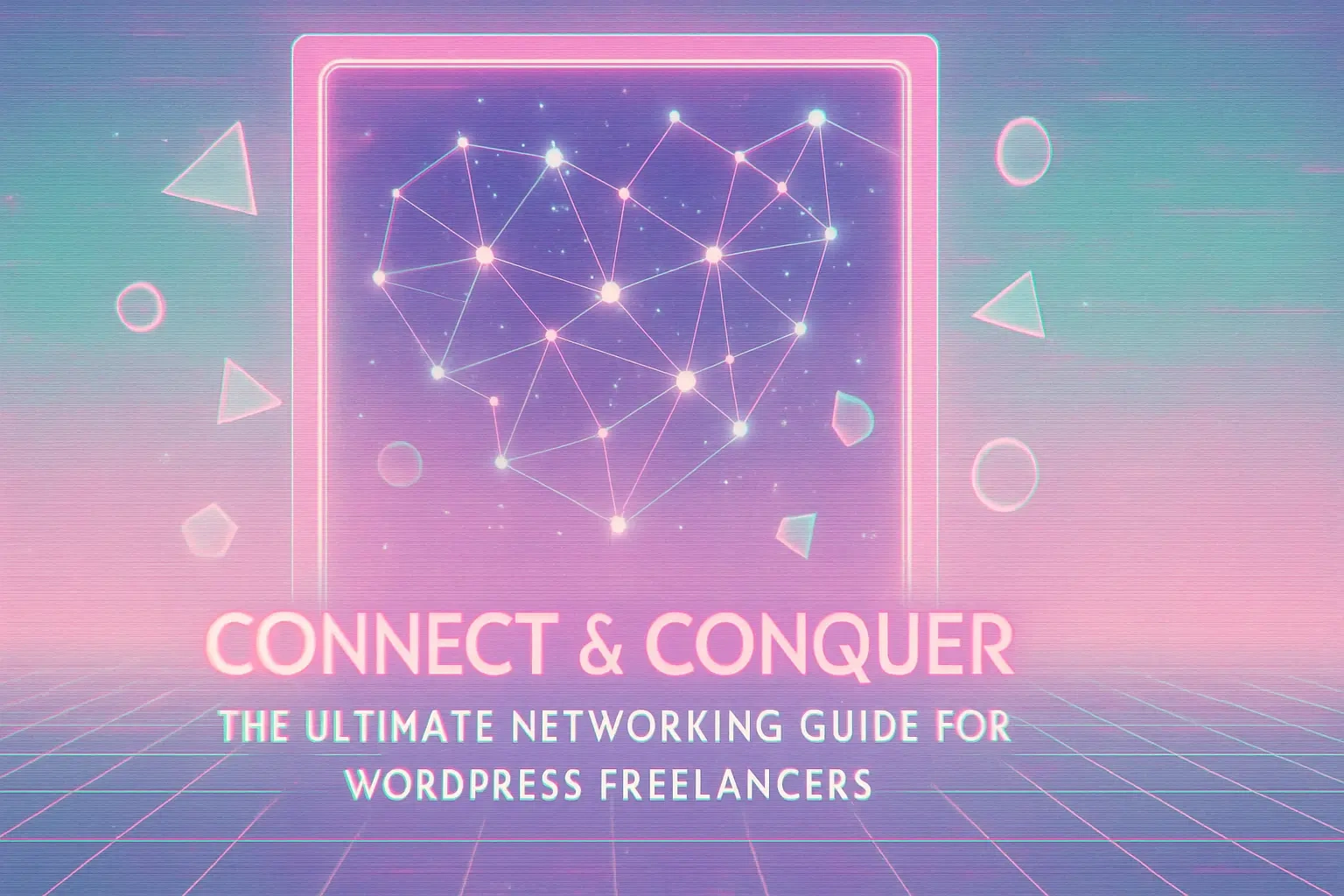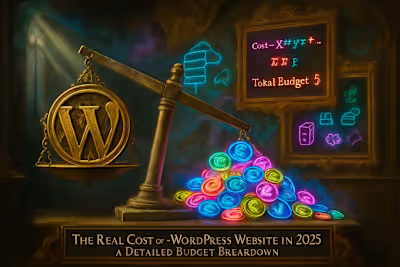Connect & Conquer: The Ultimate Networking Guide for WordPress Freelancers

Connect & Conquer: The Ultimate Networking Guide for WordPress Freelancers
In-Person Networking: WordCamps and Local Meetups
What is a WordCamp (and Why You Must Go)?
Preparing for a Conference
Navigating the Event: The Hallway Track
The Art of the Follow-Up
Digital Networking: Slack, Twitter, and Beyond
Joining the Conversation on the Make WordPress Slack
Using Twitter/X to Connect with the WordPress Elite
Finding Your Tribe in Niche Communities
Conclusion
References
Connect & Conquer: The Ultimate Networking Guide for WordPress Freelancers
For a WordPress freelancer, your network is your lifeline. It's where you find clients, collaborators, mentors, and friends. Building a strong personal brand makes you more approachable, but proactive networking is how you turn that brand into tangible opportunities. Furthermore, one of the best ways to network is by contributing back to the WordPress project itself.
This guide provides a roadmap for both in-person and online networking for freelance WordPress professionals. Whether you're an introvert who dreads small talk or a social butterfly ready to work the room, you'll find practical strategies to build meaningful connections that advance your career.
In-Person Networking: WordCamps and Local Meetups
The WordPress community is famous for its in-person events. From casual coffee meetups to massive conferences, these gatherings offer unmatched opportunities to connect face-to-face with fellow developers, designers, and business owners.
But let's be honest - walking into a room full of strangers can feel intimidating. The good news? Everyone there shares your passion for WordPress. That common ground makes starting conversations much easier than you might think.
What is a WordCamp (and Why You Must Go)?
WordCamps are locally-organized conferences covering all things WordPress. Think of them as WordPress festivals where beginners and core developers mingle over coffee and code. Unlike many tech conferences that cost thousands, WordCamps typically charge $40-50 for a full weekend. That's less than your monthly hosting bill!
These events happen in cities worldwide, from San Francisco to São Paulo. Each one reflects its local community while maintaining the welcoming WordPress spirit. You'll find sessions on everything from basic plugin development to advanced performance optimization.
The real magic happens between sessions. Picture this: You're grabbing lunch and suddenly you're sitting next to the developer of your favorite plugin. Or you strike up a conversation at the coffee station with someone who becomes your next client. These aren't rare occurrences at WordCamps - they're the norm.
Why attending matters for your freelance career:
First, you'll learn from the best. Sessions cover technical skills, business strategies, and industry trends. But beyond the scheduled talks, you'll pick up invaluable insights from casual conversations.
Second, you'll put faces to Twitter handles. That developer whose blog posts you've been reading? They're probably approachable and happy to chat. Building these personal connections transforms online acquaintances into real relationships.
Third, sponsors actively seek freelancers. Companies showcasing at WordCamps often need WordPress expertise. A five-minute booth conversation could lead to your next big project.
Preparing for a Conference
Walking into a WordCamp without preparation is like showing up to a client meeting without reviewing the project brief. A little planning goes a long way.
Set clear, specific goals. Instead of vague intentions like "network more," aim for measurable outcomes. Maybe you want to meet three potential collaborators, learn about a specific technology, or connect with two plugin developers. Write these goals down and review them each morning of the event.
Research the landscape. Most WordCamps publish their speaker lineup and schedule weeks in advance. Identify sessions that align with your interests and note which speakers you'd like to meet. Check if there's an attendee list or event hashtag to see who else is coming.
Craft your elevator pitch. When someone asks "What do you do?" you need a clear, engaging answer. Keep it under 30 seconds and focus on the value you provide. Instead of "I'm a WordPress developer," try "I help small businesses create fast, secure WordPress sites that actually convert visitors into customers."
Pack strategically. Bring more business cards than you think you'll need. Include a portable phone charger - nothing kills networking momentum like a dead battery. Dress comfortably but professionally. You'll be on your feet all day, so choose shoes accordingly.
Plan your session strategy. You can't attend everything, so prioritize. Mix technical sessions with business-focused talks. Leave gaps in your schedule for spontaneous conversations. Sometimes the best learning happens when you skip a session to continue a hallway discussion.
Navigating the Event: The Hallway Track
Veterans often say the "hallway track" - those impromptu conversations between sessions - provides more value than the scheduled talks. But how do you make the most of these opportunities without feeling awkward?
Start with low-pressure interactions. Arrive early for sessions and chat with people settling in nearby. Comment on the previous talk or ask what brought them to this session. These natural conversation starters feel less forced than cold approaches.
Use the buddy system. If you know someone attending, team up for the first few hours. Having a conference buddy makes approaching groups easier. You can introduce each other, reducing the pressure on both of you.
Master the art of joining conversations. Stand near groups with open body language - those standing in a loose circle rather than a closed huddle. Make eye contact, smile, and wait for a natural pause. Then jump in with "Mind if I join you?" or "I couldn't help but overhear you talking about [topic] - I've been working on something similar."
Approach speakers after their talks. Speakers expect questions and conversations. Wait until the initial rush dies down, then approach with a specific question or comment about their presentation. This shows you paid attention and value their expertise.
Make sponsor booths work for you. Don't just grab swag and run. Ask sponsors about their products, their WordPress challenges, or whether they work with freelancers. These conversations often lead to unexpected opportunities.
Know when to exit gracefully. Not every conversation will be a winner. Have a polite exit strategy ready: "It was great meeting you. I want to catch the next session, but let's connect on LinkedIn." This keeps doors open without trapping you in unproductive discussions.
The Art of the Follow-Up
Here's a hard truth: Without follow-up, your networking efforts are wasted. Those business cards collecting dust in your laptop bag? They represent missed opportunities. The connections that transform into clients, collaborators, or mentors all start with timely follow-up.
Strike while the iron is hot. Send follow-up messages within 24-48 hours while conversations remain fresh. Wait longer, and you risk being forgotten among the dozens of people they met.
Personalize every message. Generic "Nice to meet you" emails get ignored. Reference specific parts of your conversation. Mention the project they described, the challenge they're facing, or the joke you shared over coffee. These details show you genuinely listened and care about connecting.
Provide immediate value. Did they mention struggling with site speed? Send a helpful article. Looking for a specific plugin? Share your recommendation. This positions you as a valuable connection, not just another person asking for something.
Connect across platforms. Send a LinkedIn request with a personalized note referencing your meeting. Follow them on Twitter and engage with their content. This multi-platform approach keeps you visible without being pushy.
Suggest concrete next steps. Vague promises to "stay in touch" rarely materialize. Instead, propose specific actions: "I'd love to hear more about your e-commerce project. Are you free for a 15-minute call next week?" or "I'm writing a blog post on the topic we discussed. Mind if I quote your insights?"
Track your connections. Create a simple spreadsheet noting who you met, what you discussed, and when you followed up. Set reminders to check in periodically. A quick "How did that product launch go?" message three months later can reignite valuable relationships.
Digital Networking: Slack, Twitter, and Beyond
Your network doesn't sleep when you're not at an event. While face-to-face connections have special power, the WordPress community thrives online 24/7. Digital networking lets you build relationships with developers across the globe, participate in discussions at your own pace, and establish your expertise publicly.
The key is showing up consistently and contributing meaningfully. Nobody wants to network with someone who only appears when they need something. Instead, become a familiar, helpful presence in the digital spaces where WordPress professionals gather.
Joining the Conversation on the Make WordPress Slack
The official Make WordPress Slack serves as mission control for the entire WordPress project. With over 10,000 members across dozens of channels, it's where core developers, designers, and contributors coordinate their efforts to improve WordPress.
Getting started is straightforward. Visit make.wordpress.org/chat to request an invitation. Once approved, you'll have access to channels covering every aspect of WordPress development and community building. Don't feel overwhelmed by the channel list - start small and expand gradually.
Lurk before you leap. Spend your first few weeks observing. Read the channel descriptions, notice who the active contributors are, and get a feel for each channel's culture. The #core channel moves fast with technical discussions, while #community focuses on event organization and outreach.
Choose channels strategically. Match channels to your interests and expertise. If you're into performance optimization, join #performance. Interested in accessibility? Check out #accessibility. Want to help with WordPress marketing? The #marketing team needs you.
Contribute meaningfully. When you're ready to participate, start by answering questions you're qualified to address. Share relevant resources. Thank people for their contributions. Avoid jumping into heated debates until you understand the context and key players.
Respect the culture. Each channel has unwritten rules. Some are strictly business, while others welcome casual Friday conversations. Pay attention to these nuances. Never use Slack primarily for self-promotion - it's about contributing to WordPress, not advertising your services.
Build relationships gradually. Notice who consistently provides helpful answers. Send them a direct message thanking them for a particularly useful insight. These one-on-one connections often develop into valuable professional relationships.
Using Twitter/X to Connect with the WordPress Elite
Twitter (or X, as it's now known) remains the public square for WordPress discussions. Core contributors share development updates, agencies announce new projects, and developers debate the latest trends - all in real-time.
Follow strategically. Start with WordPress thought leaders like Matt Mullenweg, Helen Hou-Sandí, and Josepha Haden Chomphosy. Add influential plugin developers, theme shop owners, and WordPress-focused agencies. Look for people who share valuable insights, not just promotional content.
Engage authentically. Don't just lurk - participate! Reply to tweets with thoughtful comments or questions. Share others' content with your own insights added. Quote tweet with additional context or a different perspective. This visibility helps you become recognized in the community.
Share your journey. Tweet about WordPress problems you've solved, lessons learned from projects, or interesting code snippets. Use relevant hashtags like #WordPress, #WordPressDevs, or event-specific tags like #WCUS. This positions you as an active community member, not just a consumer.
Join Twitter chats. Some WordPress professionals host regular Twitter chats on specific topics. Participating shows expertise and helps you connect with like-minded professionals. Even if you can't join live, reviewing the hashtag later provides valuable insights and potential connections.
Build your list. Create a Twitter list of WordPress professionals you want to follow closely. This helps you cut through the noise and ensures you don't miss important updates from key community members.
Remember the human element. Behind every Twitter handle is a real person. Congratulate people on achievements, offer support during challenges, and celebrate community wins. These human connections often translate into professional opportunities.
Finding Your Tribe in Niche Communities
While Make WordPress Slack and Twitter cover broad WordPress discussions, specialized communities offer deeper connections around specific interests. These focused groups often provide more intimate networking opportunities.
Facebook Groups thrive around page builders. If you work with Elementor, Divi, or Beaver Builder, their respective Facebook communities buzz with activity. Members share tips, troubleshoot issues, and often post job opportunities. The key is contributing helpful answers before promoting your services.
Reddit rewards genuine participation. The /r/WordPress subreddit sees constant activity from developers seeking help. Building karma by providing solid answers establishes credibility. Avoid any hint of self-promotion - Redditors have zero tolerance for spam.
Discord servers foster real-time collaboration. Many WordPress businesses and projects maintain Discord servers for community support. These offer more casual, conversation-style interactions than formal forums. The WordPress.com community Discord, for example, blends support with general WordPress chat.
Local Facebook groups connect nearby freelancers. Search for WordPress groups in your city or region. These often coordinate informal meetups, share local job opportunities, and provide region-specific advice about rates and clients.
Specialized forums still matter. Don't overlook traditional forums like WordPress.org support forums, Stack Overflow, or the WordPress Development Stack Exchange. Consistently providing helpful answers builds your reputation and often leads to direct client inquiries.
Choose quality over quantity. You can't meaningfully participate in dozens of communities. Pick 3-5 that align with your expertise and interests. Become a recognized, helpful member rather than spreading yourself thin across too many platforms.
Remember, each community has its own culture and expectations. Spend time understanding these dynamics before diving in. The goal isn't to be everywhere - it's to be genuinely helpful in the communities that matter to your freelance business.
Conclusion
Networking as a WordPress freelancer isn't about collecting business cards or LinkedIn connections. It's about building genuine relationships within a community that values collaboration, learning, and mutual support.
Start small. Pick one upcoming WordCamp to attend or one Slack channel to join this week. Set a realistic goal - maybe it's having three meaningful conversations or answering five questions helpfully online. The WordPress community rewards those who show up consistently and contribute authentically.
Your next client, collaborator, or mentor is out there. They might be debugging code in the Make WordPress Slack right now, or planning to attend the same WordCamp as you next month. By combining strategic in-person networking with consistent online presence, you'll build a network that sustains and grows your freelance business.
The WordPress community has always been about democratizing publishing. As a freelancer, you're part of that mission. Every connection you make, every piece of knowledge you share, and every relationship you build strengthens not just your own business, but the entire ecosystem.
So get out there - whether "there" is a conference hall or a Slack channel. Your network is waiting, and the WordPress community is remarkably welcoming to those who approach it with genuine interest and a helpful spirit. Connect, contribute, and watch your freelance career flourish.
References
Like this project
Posted Jul 6, 2025
Grow your freelance WordPress business by mastering the art of networking. Discover how to leverage WordCamps, local meetups, and online communities to build valuable connections.









